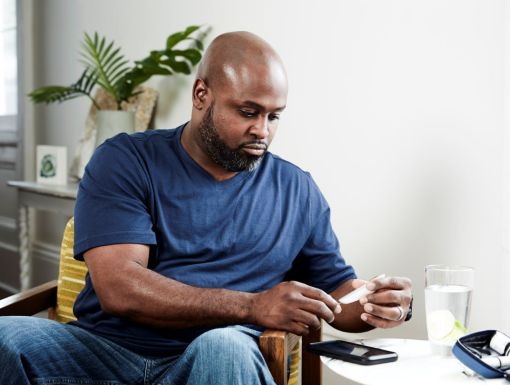
Why High Blood Pressure and Type 2 Diabetes Can Affect Your Sex Life
Men's health and chronic conditions
Preventing the development of ongoing conditions is ideal for your health. However, effectively managing existing chronic conditions is essential to prevent future complications. High blood pressure (hypertension) and Type 2 diabetes, as well as obesity, are common long-term conditions affecting men that can negatively impact sexual function. This article will review how these two conditions can contribute to erectile dysfunction and low libido (sex drive) in men, discuss potential treatment options, and offer prevention tips.
By understanding the connections, you can take steps to improve your health and get more out of life.
Risk factors: High blood pressure and diabetes
High blood pressure and Type 2 diabetes are risk factors for sexual dysfunction because they affect the blood vessels and nerves. High blood pressure can damage the blood vessels and impair blood flow, which is essential for achieving and maintaining an erection. In addition, it can affect the nerves that control the erection process, further contributing to erectile dysfunction.
Type 2 diabetes can cause damage to the nerves and blood vessels throughout the body due to consistently high blood sugar levels. This damage can lead to a condition called diabetic neuropathy, which may affect the nerves responsible for sexual function. Also, men with Type 2 diabetes often have lower testosterone levels, which may lead to low libido, or a decreased interest in sexual activity.
Signs and symptoms: Erectile dysfunction and low libido
Erectile dysfunction (ED) is the inability to achieve or maintain an erection sufficient for satisfactory sexual performance. It is a common issue among men, but its likelihood increases with age. ED can manifest in several ways, including:
- Difficulty achieving an erection
- Difficulty maintaining an erection
- Reduced sexual desire or low libido
Low libido can be both a symptom of ED and a separate issue. It is important to recognize these symptoms and discuss them with your healthcare professional to determine the underlying cause(s). They will help you pursue effective treatments.
Treatments
A variety of treatment options are available for ED and low libido related to high blood pressure and Type 2 diabetes, including:
Treating the underlying condition: Managing high blood pressure and Type 2 diabetes through medication, diet, and exercise can significantly improve sexual function.
Monitor your blood pressure and blood sugar levels: Enroll in the Ochsner Digital Medicine program to manage your blood pressure and blood sugar levels from the comfort of your home. You will work with your dedicated licensed clinician and a panel of professional health coaches to improve your high blood pressure, Type 2 diabetes or weight.
Medication: Oral medications can increase blood flow to the penis and improve erectile function. These include sildenafil (Viagra), tadalafil (Cialis), and vardenafil (Levitra). However, these medications may not be suitable for everyone, particularly those taking certain blood pressure medications or who have certain pre-existing health conditions.
Lifestyle changes: Maintaining a healthy weight, exercising regularly, quitting smoking, reducing alcohol intake, and reducing stress can all improve sexual function and overall health.
Psychological counseling: Sexual dysfunction can sometimes have psychological causes, such as stress, anxiety or depression. In such cases, counseling or therapy may be beneficial.
Testosterone replacement therapy: Testosterone replacement therapy may be considered if a low testosterone level is confirmed by a lab test and is suspected to be a major cause.
Prevention methods
Preventing high blood pressure and Type 2 diabetes reduces your risk of sexual health issues. Here's what you can do:
Maintain a healthy weight: Obesity is a significant risk factor for both high blood pressure and Type 2 diabetes. Eat a balanced diet and engage in regular physical activity.
Exercise regularly: Aim for at least 150 minutes of moderate-intensity aerobic exercise (cardio) or 75 minutes of vigorous-intensity aerobic exercise per week. It is even more beneficial to add a few sessions of resistance training (muscle-strengthening) per week.
Eat a balanced diet: Consume whole, unprocessed foods, such as fruits, vegetables, whole grains, lean proteins, and healthy fats. Limit your intake of processed foods, added sugars and saturated fats.
Limit or avoid alcohol consumption: Excessive alcohol intake can contribute to high blood pressure and Type 2 diabetes. Moderate alcohol consumption is defined as up to one drink per day for women and up to two drinks per day for men.
Don't smoke: Smoking is a significant risk factor for cardiovascular disease and can contribute to high blood pressure. If you smoke, consider seeking help to quit.
Reduce stress: Chronic stress can contribute to high blood pressure and poor overall health. Find healthy ways to cope with stress, such as practicing relaxation techniques, engaging in hobbies, or seeking support from friends and family.
Managing your condition
ED and low libido can greatly affect a man's quality of life. High blood pressure and Type 2 diabetes are common causes behind these sexual health issues. Recognizing the signs and symptoms, seeking appropriate treatment, and applying preventative measures can help men maintain a healthy and satisfying sex life. As with any health concern, it is crucial to consult with a healthcare professional for personalized advice and guidance.
Are you living with a common chronic condition? Enroll in the Ochsner Digital Medicine program to control and prevent further side effects of high blood pressure, Type 2 diabetes or weight. As a member of the program, you’ll have the support of professional health coaches and a licensed clinician. They will encourage you to stay up to date with annual screenings, manage your medications and provide lifestyle support. Easy digital tools allow you to take care of yourself at home—limiting extra trips to the clinic.
Digital Medicine helps you manage common chronic conditions. Learn more at Digital Medicine | Ochsner Health.



